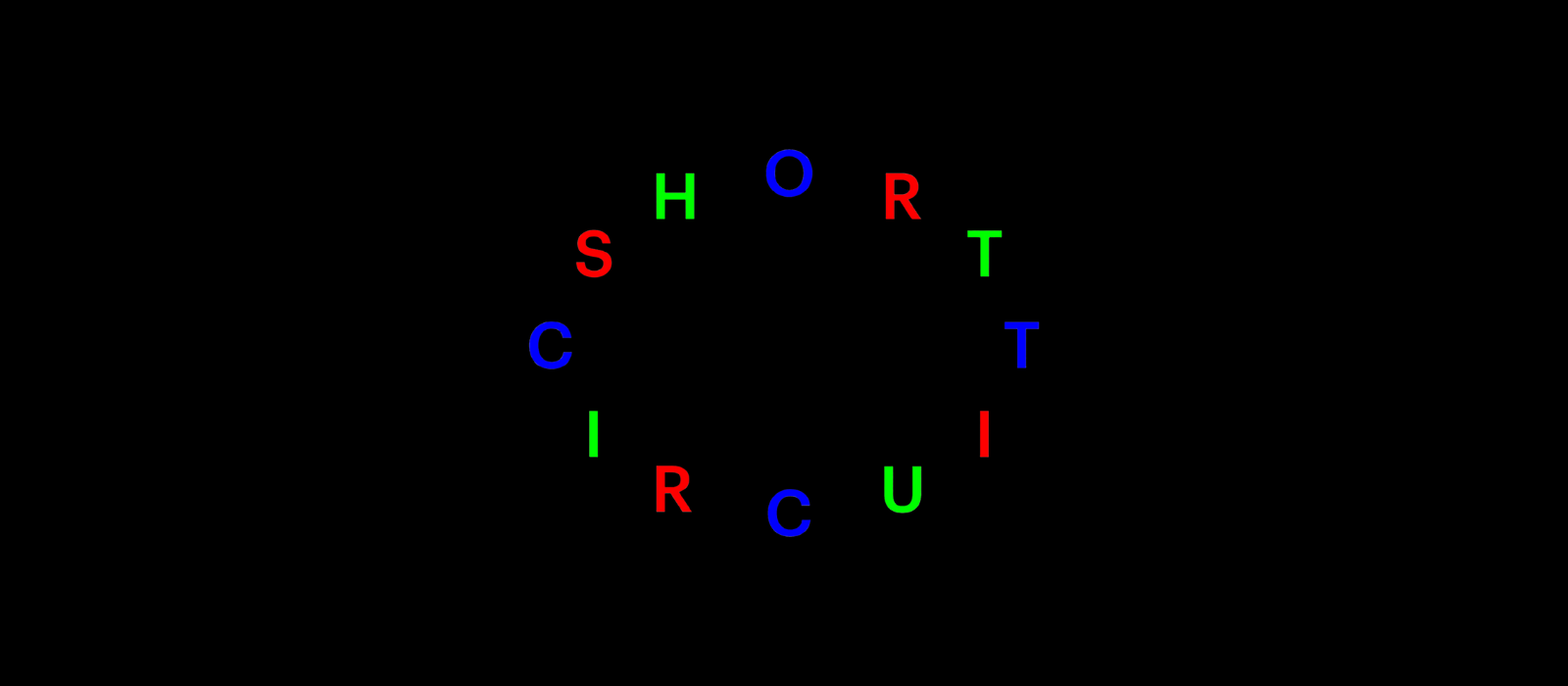
“After four years, Film City Futures has opted to conclude its delivery of Short Circuit, which will complete on 30 June 2024.
Having launched the programme in the most challenging of circumstances in April 2020, our four years of delivery has seen the development and production of over 30 short films which have enjoyed national and international exhibition and recognition, most notably by BAFTA and BIFA.
It has been our privilege to work closely with our outreach partner Glasgow Film to support the next generation of Scottish writers, producers, and directors. We see this moment as an opportunity for creative renewal and reflection, giving Screen Scotland with the support of BFI NETWORK time to consider how they can build on the successes of Short Circuit and ensure the ongoing support of filmmaking talent in Scotland.
BFI NETWORK and Screen Scotland have agreed funding for talent development activity in Scotland until 31st March 2026, and in conjunction with the recent Screen Scotland strategy to 2030, support for new and emerging filmmaking talent is clearly enshrined in both organisations’ ambitions for Scotland. Our team will oversee Short Circuit activity including short film production, development of projects on our First Feature slate, and support for participants on our training programmes, until 30th June 2024.
During this time, Screen Scotland with the support of BFI NETWORK will be developing a continuation strategy that will allow ongoing support for live individual projects and for the wider filmmaking community in Scotland.
For those of you have awaiting a decision on your application to the latest round of our First Features programme, our team are in the process of finalising the shortlist and you will be informed of the outcome by Wednesday 10 th April.
Should you require additional information on any matter relating to Short Circuit or ongoing support, please do contact me at director@filmcityfutures.com.”
Tiernan Kelly
Director
Film City Futures
We have selected four filmmakers who have previously been supported through our Sharp Shorts funding programme to attend the four day market from 5th to 8th February 2024.
The Short Film Market in Clermont-Ferrand is the leading industry event for short films in the world. It brings together 3,600+ accredited visitors yearly from over 80 countries who get access to a catalogue of 7,500 recent titles. The Market combines physical and digital components to address the needs of the industry, from production to promotion and distribution, in an open, inclusive and responsible environment. It is the main marketplace for sales, acquisitions and licensing of short films with opportunities on the French, European and international markets. Its ambitious industry programme fosters creativity, co-production and the circulation of works.
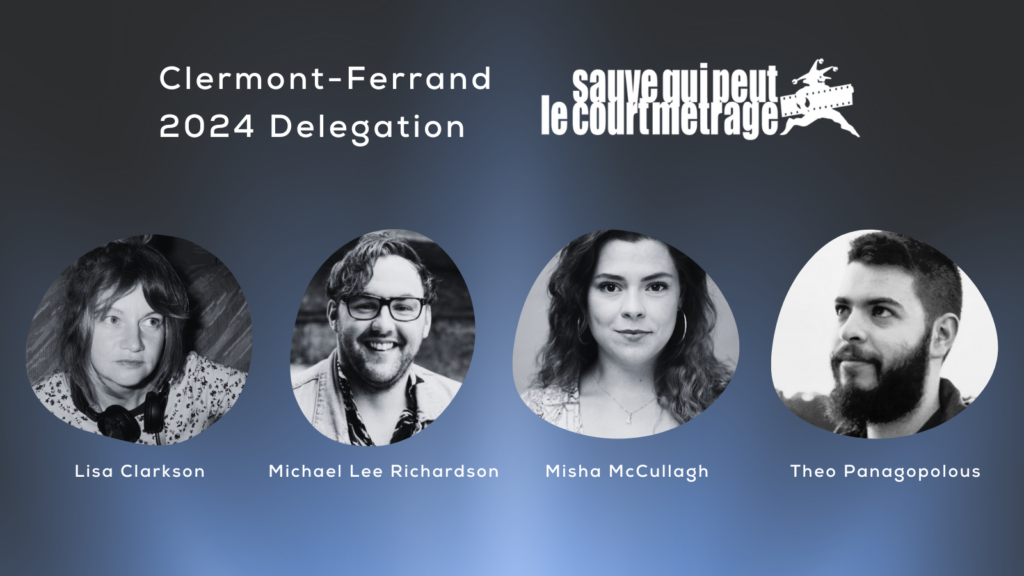
The four Short Circuit delegate filmmakers are;
Read about each of them below.
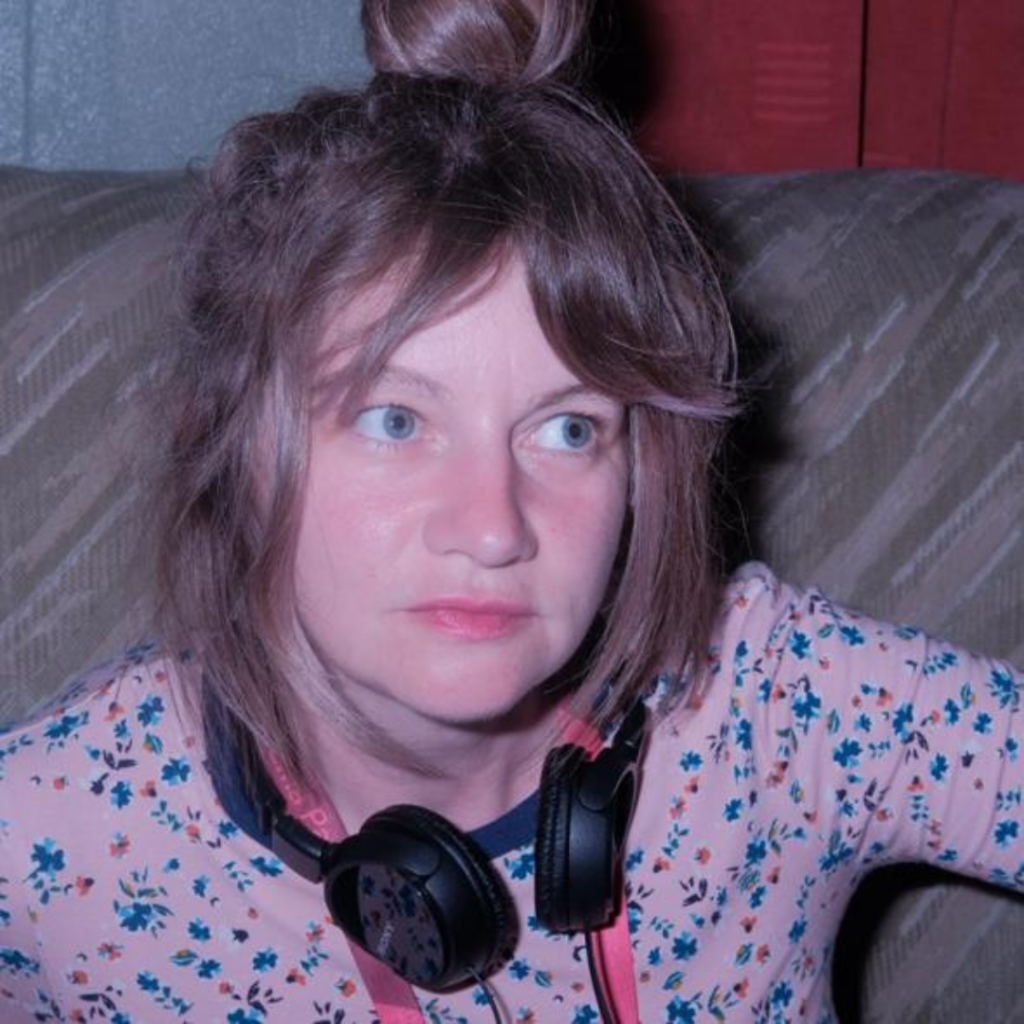
Lisa is a writer and director from Edinburgh, Scotland. She graduated from the National Film and Television School’s MA Directing Fiction in 2021, as Channel 4 Scholar. Her graduation film, Muse, won the school’s Panalux and Sargeant Disc prizes for excellence. Since returning home to Scotland she has directed a number of projects for film and television; directing an episode of BBC Four’s Skint, writing and directing Paternal Advice (Short Circuit/ BFI NETWORK), as well as shadowing and 2nd unit direction on original series The Rig (Amazon) and Granite Harbour (BBC Scotland). She is currently developing a number of long form projects, including a series set in her beloved Glasgow.

Michael Lee Richardson is a writer and filmmaker based in Glasgow. They are passionate about telling rich, authentic stories about queer and working class lives and culture. They have film and television projects in development with a range of different production companies including their first feature, A Good Spell, with Bombito. Michael is an Edinburgh Television Festival Ones to Watch, a BBC ‘Writer to Watch’ and an alumni of Young Film Foundation, Torino Film Lab and EIFF Talent Lab. Michael’s first short film as a director, Just Jackie – a bubblegum pop tale about queer friendships, for kids – is currently on submission. Michael’s first short film as a writer, My Loneliness is Killing Me, won a BAFTA Scotland Award in 2018. It’s been shown on BBC Scotland, and at film festivals around the world. Outside of writing, Michael likes 80s makeover montages, witches and having a little look around the shops.
Represented by Louisa Minghella at Revolution Talent.

Misha is a producer, with interdisciplinary experience in the creative industries. She is a BAFTA Prince William Bursary recipient and a GFF New Talent Mentee. She was selected for Short Circuit’s Producer Accelerator in 2021. Misha works in association with Blazing Griffin who are executive producers of Misha’s 2022/23 slate. She is currently developing a feature film We Are Not Animals, about Scottish prison reform in the 1980s, directed by Khaled Spiewak, written by RTS winning Stef Smith and with BAFTA winning DOP Alan McLaughlin. She also produced BFI Network short Candy with Sarah Grant which is currently tearing up the festival circuit, with three BAFTA and BIFA qualifying festivals already under its belt and a top prize win at 16 Days 16 Films. Misha also works as a production coordinator, recently on CBBC’s The Dumping Ground, The Hogmanay Show 2022 and Molly and Mack series 3 & 4. Misha is driven to create work that is bold and vivid, amplifying underrepresented voices whilst diversifying and promoting the wealth of Scottish based talent on and off screen.
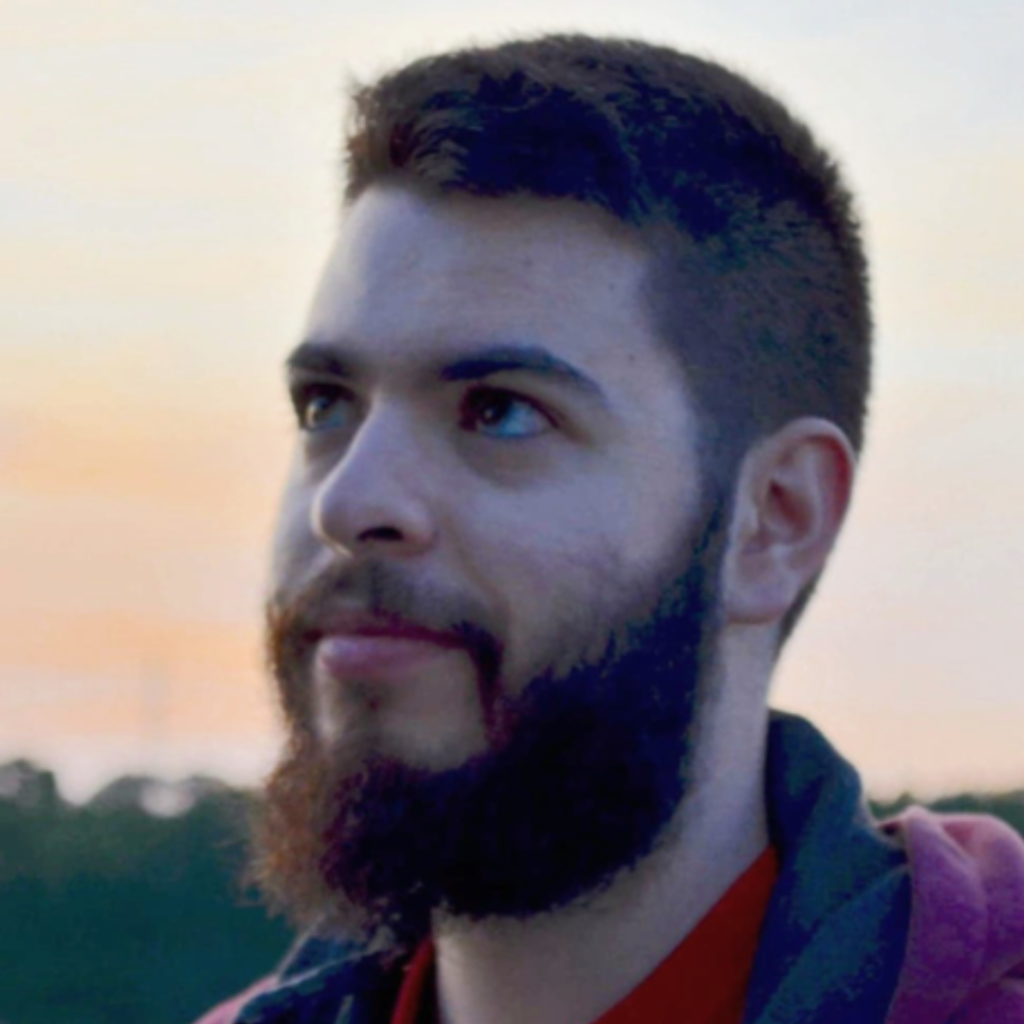
Theo Panagopoulos is a Greek-Lebanese-Palestinian filmmaker, film programmer and PhD candidate based in Scotland. His work explores themes of collective memory, displacement, fragmented identity and language in an equally sensitive and political way. He has directed multiple short films that have screened in festivals such London Short Film Festival, Encounters, DocLisboa, Thessaloniki Documentary Festival etc. and has completed his first commissioned film with Screen Scotland and BFI Network in association with Short Circuit called The Key, inspired by his Palestinian ancestry. He is currently working on his new film called The flowers stand silently, witnessing commissioned by the Scottish Documentary Institute and Screen Scotland.
Lisa, Michael, Misha and Theo, will be joined by an additional four documentary filmmakers selected by SDI. These filmmakers are; Meray Diner, Caitlin McMullan, Julia Parks and Gregor Sinclair.
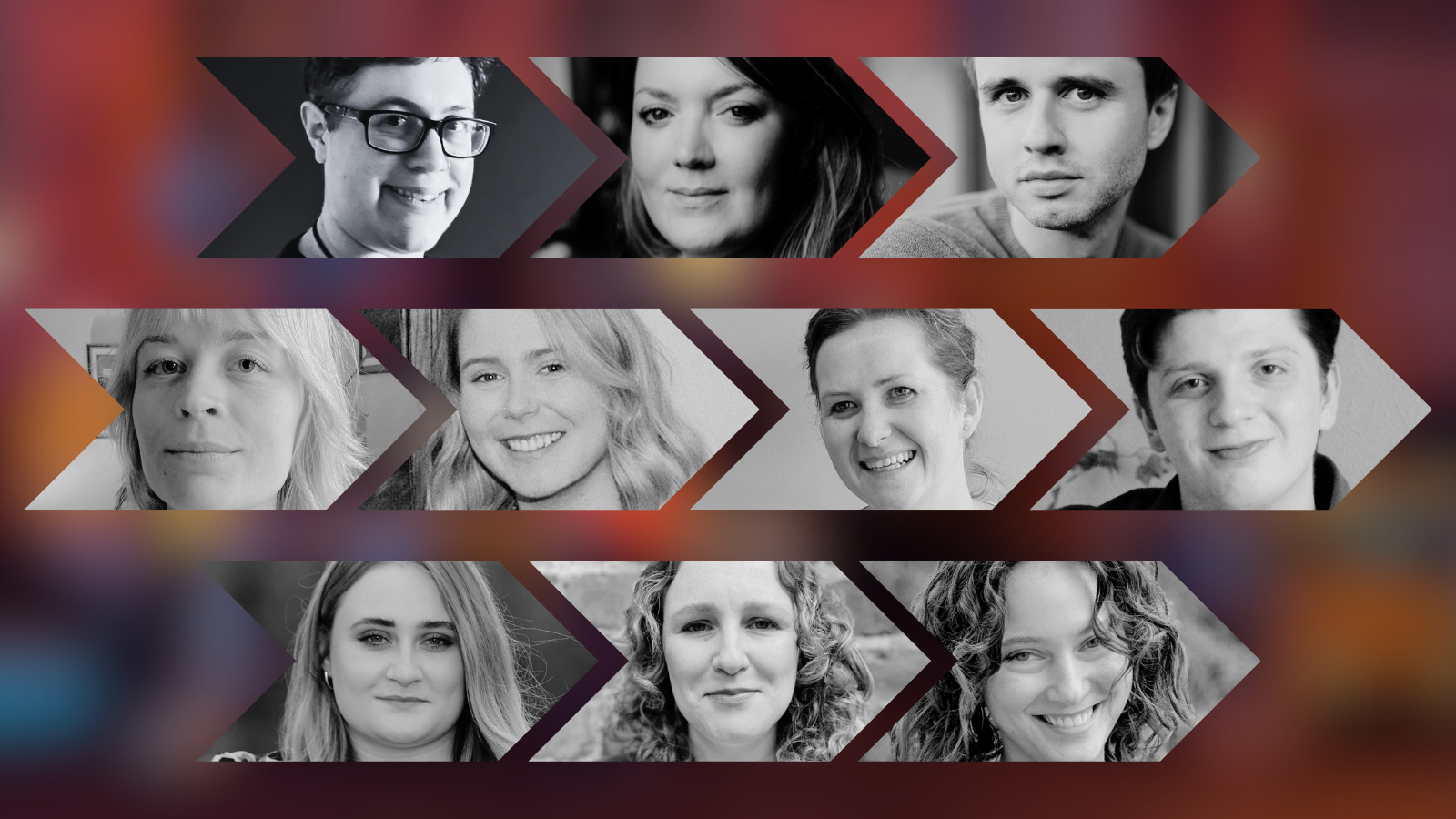
L-R Top Row: Bryn Weaver, Grace Kirkwood, John Scougall
L-R Middle Row: Josefin Bagge, Kat Tweedie, Lynne Cowie, Nathan McCuaig
L-R Bottom Row: Rachel Ellen MacKay, Rachel-Anne Clarke, Saffia Sage
In October 2023 we opened submissions to Scotland-based producers at the start of their careers who are looking to take that next step into the industry but may need support in furthering their knowledge of the industry or expanding their skillset.
This years programme will be delivered by Short Circuit with film producer Irune Gurtubai. Irune’s second feature film, Limbo (Ben Sharrock, 2020), produced through her company Caravan Cinema, was part of the Cannes 2020 Official Selection and had its world premiere at TIFF. She received the BIFA Breakthrough Producer award for her work on the film. Limbo was nominated for two BAFTA awards for Best British Film and Outstanding Debut and it won four BAFTA Scotland Awards including Best Film.
After an assessment and selection process – carried out by external assessors, and the Short Circuit team – ten participants were chosen to take part in Producer Accelerator.
The selected participants are:
Find out more about each of the participants and why they’re looking forward to starting the programme:

I am a South African creative based in Scotland, with a background in fiction writing and editing as well as photography and project management. I have a passion for storytelling from unexpected perspectives, which engage the audience’s empathy and change the way we see the world.
“I am so grateful to be taking part in this fantastic programme. I look forward to gaining industry-relevant skills and experience, as well as forming connections with other emerging filmmakers.” – Bryn Weaver
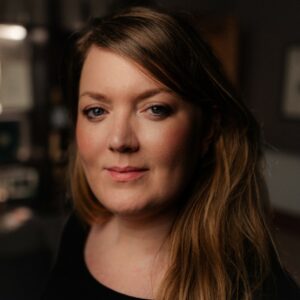
Grace is an award-winning documentary producer based in Glasgow. With a background in news journalism, she started her career 10 years ago at BBC Scotland on the journalism trainee scheme before moving into documentary and factual TV programming. Recent credits include BAFTA Scotland Award winning Three Mothers, Two Babies and a Scandal for Amazon Prime and RTS Scotland award winning online series The New Scots. Grace has filmed extensively across the UK and abroad including in China, the United States, Bali and Lebanon. She is passionate about telling good stories and keen to gain experience in scripted productions.
“I am very excited to be taking part in the Short Circuit Producer Accelerator Programme. I have always had a keen interest in drama and short film production and can’t wait to meet the rest of the cohort and the industry experts we will be learning from.” – Grace Kirkwood

John trained as an actor at the Royal Conservatoire of Scotland. He has worked on a number of high profile shows such as BAFTA nominated The Victim (BBC), Unforgotten (ITV) and Lovesick (Netflix), as well as with National Theatre of Scotland, The Tron, The Traverse and Shakespeare’s Globe Theatre.
As a producer, he is currently part of the producing team making the recently announced Silibil N’ Brains feature film, directed by James McAvoy. He has various television and film productions in development with his company Mobly Jack Productions and is represented for producing and acting work by United Agents Ltd.
“Ever since I first heard about this Short Circuit programme, I have been hoping to be involved in Producer Accelerator. Having seen how incredible it has been for my colleagues in the industry, I cannot wait to start and learn as much as possible from some of the best in the business. I feel incredibly grateful to have been selected and I am really looking forward to working with the other producers on the course. I know that being part of this programme will significantly advance the producing side of my career further, and I cannot wait to put everything I learn into practice with my current film and television projects.” – John Scougall
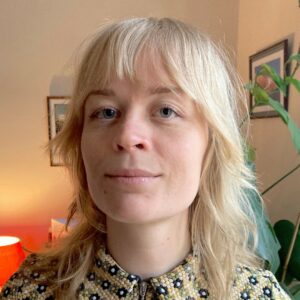
Josefin is a Junior Producer & Production Coordinator based in Glasgow, born in Sweden. She has been working with award winning production company Forest of Black since 2020, supporting lead producers on a diverse range of creative, commercial and documentary projects as well as leading production on shorts and promotional content. Prior to her career in Production she gained a masters degree in Sound for the Moving Image (2019) and has a strong passion for audiovisual storytelling. She recently worked as on-set Producer with director Ciaran Lyons on his self-funded debut feature film ‘Tummy Monster’ premiering in 2024.
“I’m so delighted to have been selected for this year’s Producer Accelerator cohort, and am very much looking forward to working with the Short Circuit team and meeting my fellow participants. Taking part in the course will be invaluable to progressing my career in creative producing and giving me the required skill set, knowledge and confidence.” – Josefin Bagge
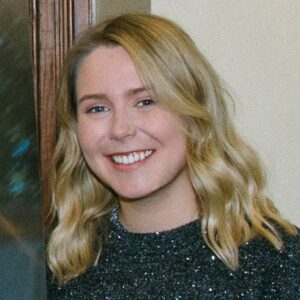
Katriona is a Scottish Producer with a passion for collaborative storytelling. Since studying at Screen Academy Scotland, she has been working predominantly within the production department of TV and commercials.
She was selected for GMAC’s Little Pictures scheme in 2022. This led her to set up ‘Kit ’n’ Kat Productions’ with her co-producer. She is committed to use this platform to tell bold, empowering stories with diverse representation on and off screen.
“I am delighted to have been been selected to take part in this years Producer Accelerator. It will allow me to gain essential production knowledge and confidence in my abilities. The training and support the scheme provides will be invaluable and a perfect stepping stone towards producing my own funded short.” – Kat Tweedie
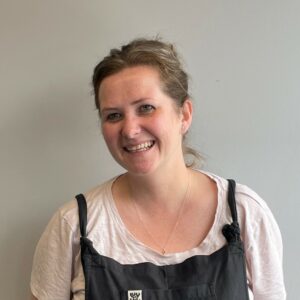
Lynne is a Producer in Unscripted television, having worked across various genres including Documentary, Factual Entertainment, Quiz, Game and Entertainment programming. She has spent the last two years managing and curating a new Entertainment TV development training scheme with TRC, one of the UK’s leading providers in broadcast training.
Producing her first short in 2023 through GMAC’s Little Pictures, Lynne worked with writer/director Mar Felices on the archive based documentary Return to Arabia. Lynne aspires to bring her range of skills together with her passion for storytelling as she continues her journey into film producing.
“I am delighted to have been selected for Short Circuit’s Producer Accelerator initiative. Gaining a formal education in understanding the development process is something I’m really looking forward to, as well as meeting and forming a network with other emerging Producers. Following the birth of my second baby recently, I am grateful for the opportunity to further my career and learn from a host of experienced industry professionals.” – Lynne Cowie

Nathan is an emerging producer based in Paisley. After finishing his masters in Film Producing, he was selected by ScreenSkills on to their Trainee Finder programme. He spent the past year working on productions such as: Sebastian (Screen Scotland, BFI), Harvest (BBC Film, Sixteen Films) Kenmure Street (Barry Crear) Cold War Hockey (Purple TV) and Float (Black Camel Pictures). He is committed to bringing diverse voices to the screen, especially LGBTQIA+ and working class stories. Nathan is passionate about creating films with mental health and the environment at the core of his producing.
“Being recognised by Short Circuit as a promising producer in Scotland is very exciting. I am ready to build on my knowledge of filmmaking and collaborate with other producers. I hope to gain more insight into the business side of producing, I can’t wait to get started!” – Nathan McCuaig

Rachel Ellen MacKay is an independent TV producer and broadcaster based in the Isle of Lewis. She comes from a strong television production background working across Factual Entertainment, Live Music and Entertainment Programming and Drama. Recent credits include flagship international travel show Immigration Tracks le Anne NicAlpein on BBC Alba. Rachel also co-hosts BBC Radio nan Gaidheal’s popular podcast ‘Fad Botal Fion’. Rachel is passionate about bringing colourful, contemporary Gaelic stories to the screen.
“I am delighted to be a part of the Producer Accelerator Programme 2024! The programme is an exciting opportunity to collaborate and nurture the skills required in film making. I am really interested in learning more about high quality short form, and I can’t wait to get started!” – Rachel Ellen MacKay

Rachel-Anne is a TV producer who cut her teeth on factual programmes such as, Supershoppers, The One Show, Horizon and Morning Live before making the long awaited transition to the comedy department of BBC Studios to produce their first all female production ‘Who Runs The World?’. At BBC Studios she produced Short Stuff and worked as Assistant Producer on Two Doors Down and Mrs Brown’s Boys. In 2021 she was selected as one of Edinburgh TV Festival’s Ones To Watch, 2 years later she founded small indie Pure Leo, with a commitment to promoting and working with diverse, comedic voices.
“I’m delighted to be participating in this year’s Producer Accelerator scheme and I’m looking forward to expanding both my skill set and network as I learn more about producing film from the talented Irune Gurtubai.” – Rachel-Anne Clark
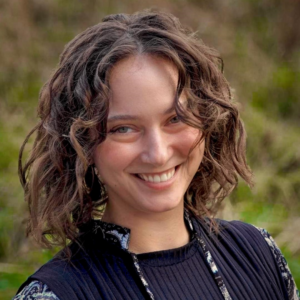
Saffia cut her teeth scouting, developing and making HETV Drama for the domestic and international markets at STV Studios.
Her body of work includes Script Editor and Assistant Producer credits across dramas like ELIZABETH IS MISSING (BBC One), SCREW Series 1 and 2 (Channel 4) and THE RIG Series 2 (Amazon). Collectively, these credits have gathered awards and nominations including RTS Scotland Best Writer, BAFTA Scotland Best Scripted Television Programme, RTS UK Best Single Drama, and an International Emmy.
As a producer, Saffia is particularly drawn to stories exploring power and relationship dynamics, queerness, and contemporary social and political issues through a character-led, entertainment-first lens.
“I’m completely over the moon to be part of Short Circuit’s 2024 Producer Accelerator cohort. The programme’s unique 360-degree approach is an empowering development opportunity for me as I continue to build my own slate of short-form and feature film projects as an emerging Creative Producer. I can’t wait to get started!” – Saffia Sage
Interested in applying for future training and funding programmes at Short Circuit? Join our mailing list to be the first to be notified about upcoming opportunities.
Follow us on Twitter, Instagram and Facebook for regular screen industry content.
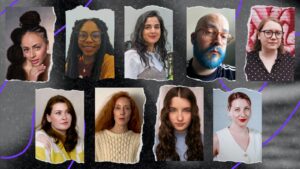
L-R Top Row: Adiza Shardow, Amanda Ajomale, Aqsa Arif, Drew Taylor-Wilson, Katherine Nesbitt
L-R Bottom Row: Lana Pheutan, Louise Barrington, Lucy Halliday, Shona Cowie
In September 2023 we invited submissions from Scotland-based professional writers, filmmakers and creative practitioners, currently working in other fields, who were interested in moving into writing for screen.
After an assessment and selection process – carried out by external assessors, the Short Circuit team and course leader David Pope – nine participants were chosen to take part in Convergence and learn the fundamentals of screenwriting shorts and feature films.
The selected participants are:
Find out more about the participants and what they’re most looking forward to about the programme:

Adiza Shardow is a Scottish/Ghanian writer performer. Screen Credits include, Waterloo Road (BBC), Casualty (BBC), River City (BBC). Theatre credits include Close Quarters (The Crucible Theatre), OZ (Tobacco Factory), and most recently was in The National Theatre of Scotland’s production of Thrown, which premiered at the Edinburgh International Festival. Adiza won the Sky arts award 2021 with The Royal Society of Literature for screen writing and is developing a new pilot with mentor Tanika Gupta and head of the program Bernadine Evaristo. She also completed the Bridge programme for TV writing with Theresa Ikoko as her mentor
“So happy to be selected for this amazing course, I’m excited to meet the other creatives and pitch to industry professionals. Even though it will be scary I can’t wait to learn from the feedback and progress my writing skills.” – Adiza Shardow
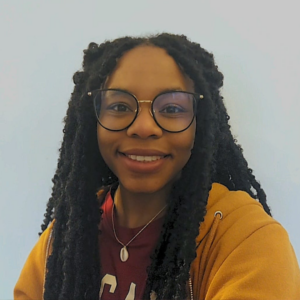
Amanda Ajomale is a Poet, Novelist, and Researcher known for weaving Yoruba and Latin American culture and language through the heart of her work. After becoming a mother in 2019, Amanda created the blog, The A Word, which features poems and short stories surrounding Queer Love, Post-Natal Depression, and Generational Healing.
Performances include the Scottish BPOC Writers Audio Anthology and the 2022 Edinburgh Book Festival, and her debut poem ‘Mama, I Really Did Try My Best’ is featured on The New Mothers’ Writing Circle website. TV credits include BBC’s The Firm, Bridge of Lies, and Question Time.
“I screamed at the top of my lungs when I found out I’d been selected for Convergence 2024. Writing has always been a major part of my life and I cannot wait to meet and connect with the other storytellers and the industry professionals, to learn and grow in our art, and to see our screenplays come to life. This will be one for the books, and I’m buzzing to get stuck in!” – Amanda Ajomale
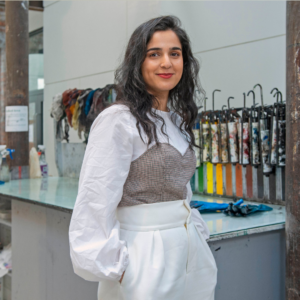
Aqsa Arif is an award-winning Scottish-Pakistani artist and filmmaker based in Glasgow. She incorporates film, printmaking, photography and poetry to construct installations in which she explores themes of dual heritage, migration and cultural dissonance. Her practice is deeply inspired by narrative structures built within folklore, mythology and cinematic spaces, exploring this through her own dual identity to reclaim and re-imagine the pre/post-colonial world.
Her film Spicy Pink Tea has been selected for BAFTA qualifying festivals and won Best Dance Film at Aesthetica Film Festival and was nominated for the Young Scottish Filmmaker prize in Glasgow Short Film Festival. Arif was selected to undertake the 20/20 residency by UAL’s Decolonising Arts Institute: a 15-month residency at Kelvingrove Art Gallery and Museum leading to her first solo exhibition, Anam Ki Almari (The Trophy Cupboard) and 20 new permanent acquisitions in 20 UK public art collections.
In 2023, she was awarded the Platform: Early Career Artist Award as well as the RSA Morton Award. She has also been nominated for the major national touring exhibition, Jerwood Survey III, launching at Southwark Park Galleries in March 2024 and touring in Cardiff, Sheffield and Edinburgh.
“The timing for Convergence couldn’t be better. I’ve recently completed two commissioned short films, and now I’m eager to dive deeper into the art of crafting narratives, developing well-rounded characters, and honing my skills in writing dialogue. I see Convergence as the perfect opportunity to nurture these aspects of my filmmaking journey, especially with the invaluable guidance and industry insights that the mentor, peer group, and Short Circuit will bring to the programme.” – Aqsa Arif
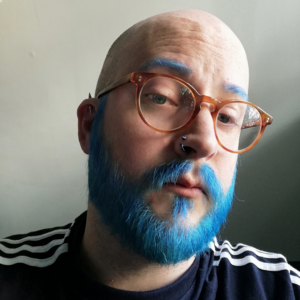
Drew Taylor-Wilson [they/them] is a neurodivergent, queer creative working in TV, Film and Theatre. They recently obtained a Masters in TV Fiction Writing from Glasgow Caledonian University. “A glittering colossus -5*” [Metro] Drew writes to advocate for seldom heard voices, creating bold contemporary queer stories that de-stigmatise mental health difficulties. Their plays have been seen across the UK, they are a former performance poet and frequently bend genre and form in both screen and stage writing. Drew is a founding co-director of Sanctuary Queer Arts and works freelance as a Director and Dramaturg. Their first TV show is currently optioned by Stampede Ventures, Los Angeles.
“I am beyond excited to be in a learning environment again – an artist’s work is never done, and collaboration fuels my fires. Having dipped my toe into TV recently, realising a life-long ambition [casually side-stepping from Theatre] – I am hungry to get to grips more with the nuts and bolts of film and film formatting, especially with the expert guidance that Convergence offers. The process has been glorious so far!” – Drew Taylor-Wilson
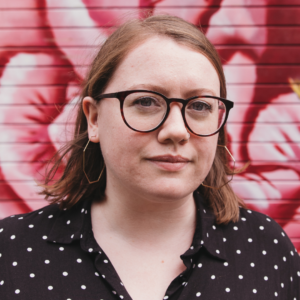
Katherine is a theatre director from Belfast, based in Glasgow. She is an Associate Director for National Theatre Connections and was an Associate Artist at the Traverse Theatre. She’s a member of the Lincoln Center Theater Directors Lab (New York) and was a finalist for the JMK Award 2021 and the Sir Peter Hall Directors Award 2021. Credits include This is Paradise (Traverse Theatre), Everyman (GSMD), Jade City (Bunker Theatre), The Present (NTS/BBC Scotland). She was recently commissioned by the MAC Belfast.
“I’m so excited to learn everything I can from David and the wider Short Circuit team, and from the rest of the cohort with the diverse experiences that they bring to screenwriting. I’m looking forward to challenging myself and moving my skills from theatre into film.” – Katherine Nesbitt
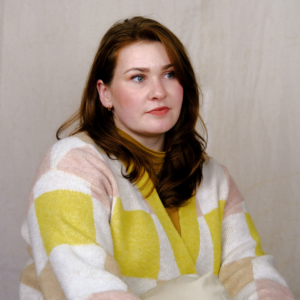
Lana Pheutan is an actor, writer and director from the Isle of Skye. She is a native Gàidhlig speaker and works bilingually across theatre and television. This year she co-wrote Glan Fhèin, BBC Alba’s highly successful flagship sitcom and directed Pretty Knickers Productions’ 5 * show Salamander. She is passionate about representing Gaels as the bold and complex individuals they are, writing stories about the people who live in these communities today, not the tweed wearing, sheep herding, whisky drinking, tattie loving, backward thinking, accordion playing version of Gaels that people are used to seeing. Although she does love tatties.
“I’m delighted to be part of Convergence 2024 and can’t wait to get cracking. Film has always felt slightly out of reach for me, so this opportunity will be perfect to help bring my stories to life through a new medium.” – Lana Pheutan
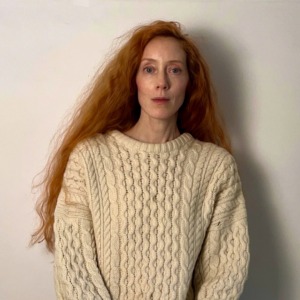
Louise is a multidisciplinary artist based in Orkney using film, dance, textiles, and sculpture. Her work focuses on the aesthetic and environmental aspects of the landscape experienced over the four seasons, weaving together a tapestry of people and place. Her screen dance film Sylph was selected for LUX Scotland September’s ONE WORK. Louise completed her film Four Seasons this autumn, which follows the changing colours and textures across the seasons experienced on Orkney, while listening to the voices from the landscape.
“I’m delighted to be part of the Convergence cohort. The opportunity is an important step forward to further develop projects, along with making new connections. It’s an exciting start to 2024.” – Louise Barrington
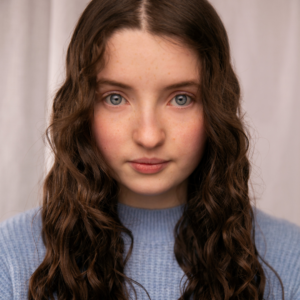
From Paisley, Scotland. Growing up was a member of PACE Youth Theatre, which delved me into performing and theatre, as a result worked with The National Theatre of Scotland on Holding/Holding On (2021). Was entirely set against ever following a path into this industry, due to utter uncertainty. Then as a teenager was cast in Blue Jean (2023) and discovered a newfound passion for the screen industry I had been catapulted into, specifically wanting to engage with it in Scotland. Most importantly, I like green beans and the Rubik’s Cube.
“The calibre of screenwriting talent in Scotland is overwhelming, so being able to be a part of a programme such as Convergence is an opportunity I won’t be taking for granted. I am looking forward to the collaborative approach Convergence offers, and most of all hoping that by the end of this course someone, or something, will be able to help tame my ceaseless thought bubbles and ramblings.” – Lucy Halliday

Shona is a storyteller and participatory artist with a broad international career. She trained at the Royal Central School of Speech and Drama and L’Ecole Jacques Lecoq before founding story-education company Fósforo, in São Paulo, Brazil and travelling with her collective Senza across Europe and Tunisia to research and platform stories of Mediterranean migration.
Now firmly based in Argyll, she continues to lead pioneering projects in heritage, social care and performance sectors in Scotland and beyond and is thrilled to be taking her first steps into broadcasting.
“I’m delighted to be part of the 2024 Convergence cohort and enter what feels like uncharted territory that has been pulling me in for a while. I’m excited about building on the foundational narrative craft I’ve developed as a storyteller, excited about telling new stories,and excited about digging up forgotten ones and figuring out the ways to bring them to life. As an artist who mainly flies solo, I’m also looking forward to learning, working and creating within a top notch team of creative companions. The journey will no doubt improve my practice exponentially. Bring on January 24!” – Shona Cowie
Interested in applying for Short Circuit’s future training programmes? Join our mailing list to be the first to know about upcoming opportunities.
Connect with us on Twitter, Instagram and Facebook.
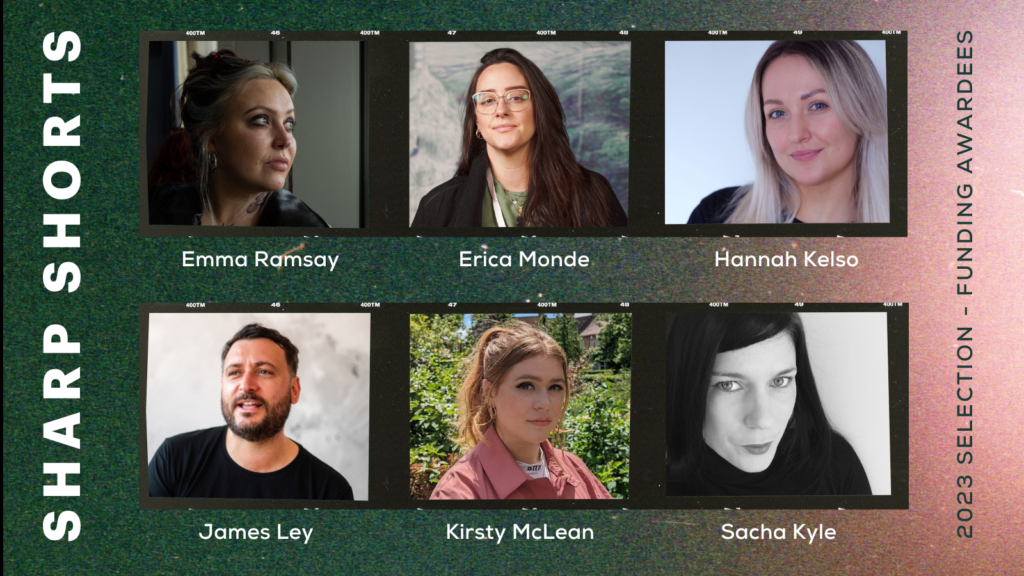
The Sharp Shorts scheme aims to identify and support through training, 1-2-1 meetings, funding and mentoring the most exciting filmmaking talent in Scotland in the early stages of their career.
In April 2023, we extended an invitation to writers, writer/directors, and filmmaking teams comprising writers, directors, and producers to submit one-page outlines of their innovative short film concepts for the fourth iteration of Sharp Shorts. 12 ideas were selected to take part in further development, supported by industry experts and the Short Circuit Talent Executives, to take their project from idea to script.
In early October 2023, the 12 teams pitched their project to a panel that was formed by Short Circuit Talent Executives; Alice Ojha, Development Executive at BBC Film; and Alice Shone, Programmer at Tribeca Film Festival, for the chance to receive production funding to make their film.
The following 6 films are today announced as the selected projects:
Writer/Director: Kirsty McLean; Producer: Saffia Sage
Synopsis: Grappling to be the centre of her dad’s attention, ABBY (12) agrees to help him sell frozen microwave meals – but when he dumps her outside the pub to babysit SANDY (8), Abby’s feelings of rejection erupt into a violent outburst against someone who seems to have everything she doesn’t.
Writer/Director: Sacha Kyle; Co-Director: Victoria Watson; Producer: Rhona Drummond; Music Producer and Composer: Giles Lamb
Synopsis: Embark on a captivating journey to the moon to discover the absurdity of our existence and the importance of human connection in this surreal dream-like animated adventure.
Writer/Director: Hannah Kelso; Producer: Danielle Goff
Synopsis: It’s Meghan’s first day on the job as a home carer. She’s left alone to visit the elderly Bonnie who has a refreshing, yet challenging approach to her personal care.
Writer/Director: Emma Ramsay; Producer: Michaela Barton
Synopsis: Polly’s been dumped and she’s done something drastic: she’s cut out her own heart. Literally. Now, it’s up to best friend Yasmin to convince Polly to embrace her broken heart and swallow her own pain. Again, literally.
Writer/Director: James Ley; Producers: Jack Cowhig and Laura McBride
Synopsis: Alan and Blair’s first date is going so well that Alan goes to wash his willy in the gents in anticipation of a blow job on the way home, however doing so opens a portal to a terrifying speakeasy a mile under Glasgow from which there seems to be no escape.
Writer/Director: Erica Monde; Producer: Isabella Bassett
Synopsis: Ainsley works at a thunderous factory by the sea, attempting to drown out the cacophonous chimes, groans, grinding, banging, and echoes their body makes seemingly without reason. However, their daily ritual is disrupted when a new co-worker Simon arrives.
The selected teams will each receive up to £25,000 each to produce their film. Teams will also take part in intensive production training, and will be paired with an established Producer, Director or Writer who will mentor the team to help them to deliver their final film.
These talented filmmakers represent the bright future of Scottish cinema, and we couldn’t be more thrilled to be part of their journey. With our support, they’ll receive invaluable guidance, mentorship, and resources to help bring their cinematic visions to life.
Miriam Newman, Talent Executive at Short Circuit, said: “Along with the growing team at Short Circuit, we are delighted to announce the fourth year of Sharp Shorts production awards, supporting new and exciting Scottish filmmaking talent to collaborate and share their visually ambitious stories with audiences at home and internationally.”
Kieran Hannigan, Head of Scripted at Screen Scotland said: “The standard of applications this year was higher than ever. The six chosen projects are a rich and diverse range of high-quality projects that confidently announce distinct filmmaking voices with bright futures.”
Since the launch of Sharp Shorts in May 2020 the Short Circuit team and pool of external readers have assessed over 1200 submissions for the scheme. 56 short film projects have received development support and 31 projects have been awarded funding.
Stay tuned for updates as these projects evolve and move closer to production. We’re confident that they’ll captivate audiences far and wide with their creativity and storytelling prowess.
Featured photo credit: Celine Antal from Sharp Shorts funded film Just Jackie
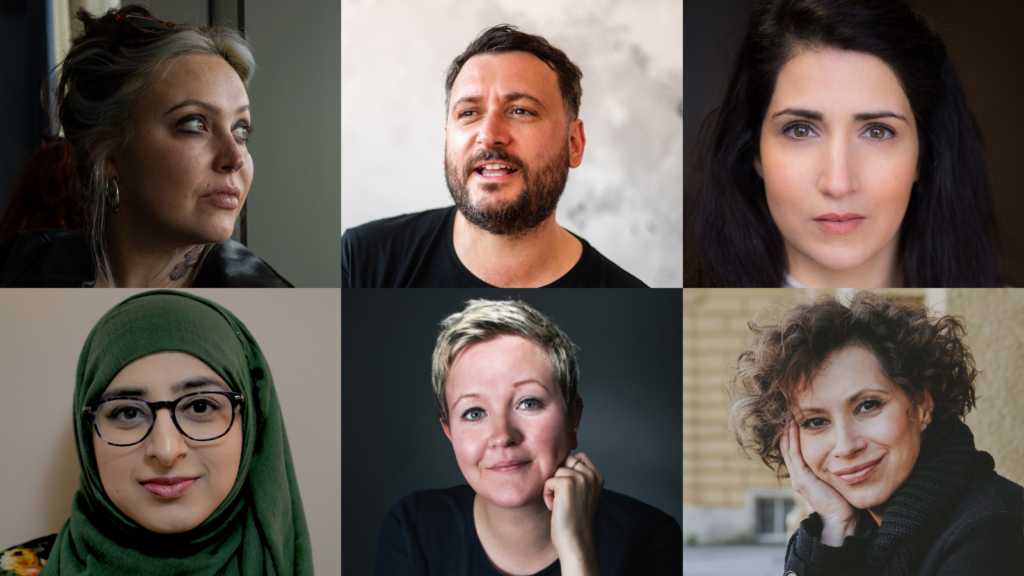
Top Row L-R: Emma Ramsay, James Ley and Maryam Hamidi
Bottom Row L-R: Raisah Ahmed, Stef Smith and Tena Štivičić
The First Features scheme is for writing, writing/directing and producing talent from all across Scotland who have bold and captivating fiction projects that possess a strong theatrical ambition and have the potential to resonate with audiences worldwide.
For this round, we received 64 eligible applications that were initially assessed by our pool of external readers. Following an extensive assessment process involving Screen Scotland’s Scripted team and the Short Circuit Talent Executives 6 projects have been selected by to receive development support and funding.
Now, without further ado, let’s meet the talented filmmakers and their exciting projects that are set to leave an indelible mark on Scotland’s screen sector:
Writer: Tena Štivičić; Director: Sam Hodges
Synopsis: A celebrated choreographer runs a dance company with his wife, a former dancer now business partner. In the twilight of their careers they face the changing tide of opinion towards questions of power, loyalty and artistic discipline.
Writer/Director: Maryam Hamidi; Producers: Alysia Maciejowska and Shirine Best
Synopsis: Part possession horror, part comedy-drama, a genre bending story about inherited trauma. When Iranian immigrant, Agdas is made the subject of her director daughter’s first funded documentary feature film, her state of mind begins to unravel.
Writer/Director: Emma Ramsay
Synopsis: A gentle, young father, desperate to provide for his family, is forced to work down the coal mines of 1950’s Scotland. Here, he is terrorized relentlessly by his bullish co-workers until a Faustian pact with a malevolent monster gives him the strength to fight back.
Writer/Director: James Ley
Synopsis: Gordon is homonormative and fears he might be pathologically boring until he meets Cumpig and Manpussy at a sex party in Leith. When they tell him about Europe’s biggest gay sex party in Berlin, Gordon obviously wants to go, but can he really transform into a sex pig?
Writer: Raisah Ahmed; Co-Writer: Mahsuda Snaith; Producer: Shirine Best
Synopsis: Haunted by the disappearance of her childhood best friend, housebound Ravine Roy’s world ignites with the arrival of someone inhabiting her friend’s old bedroom. As long-buried memories resurface, and the malevolent ’Soul Drinker’ returns, she must confront her past in order to break free.
Writer: Stef Smith; Director: Khaled Spiewak; Producers: Misha McCullagh and Alan McLaughlin
Synopsis: 1986. Industrial devastation engulfs Britain. An era of greed and axed social services. In the attic of a Scottish prison, four prisoners hold an officer hostage for five days. A published welfare manifesto in the national paper will guarantee the officer’s safe release. Days pass and tensions grow between the men. They’ve risked it all to expose the truth of prison conditions and have the voices of prisoners heard, was it worth it? Based on real events.
We support projects from initial idea to fully polished draft and successful applicants can expect to receive financial support towards their project along with creative/editorial support from the Short Circuit Talent Executives and the Scripted team at Screen Scotland.
Interested in applying for First Features? We have extended the deadline for the second round of First Features 2023/24. The new deadline is 10am on Monday 8th January 2024. Click here to find out more and apply.
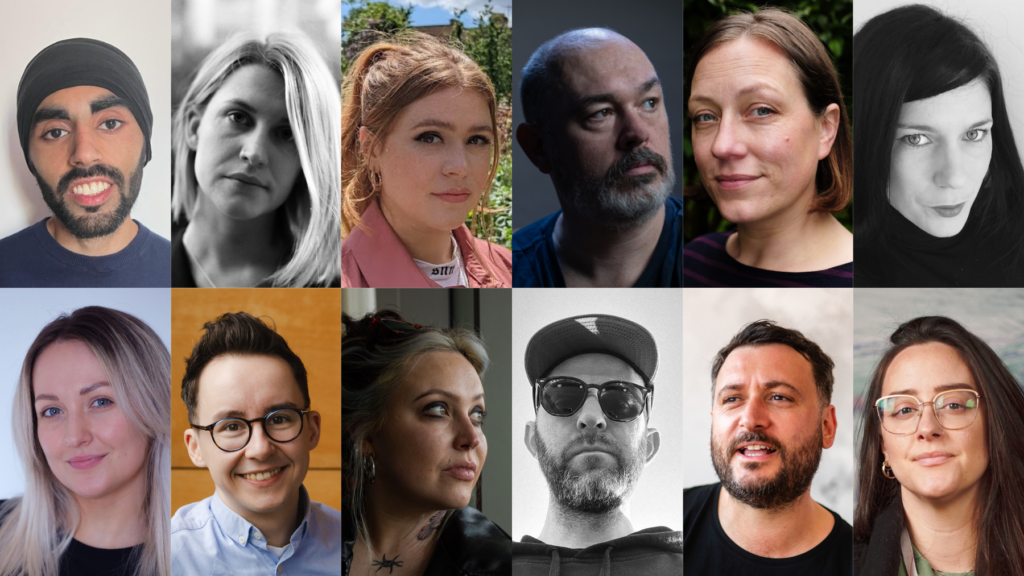
Top Row L-R: Kaljeven Singh Lally; Paisley Valentine Walsh; Kirsty McLean; Derek Anderson; Alice Clark; Sacha Kyle
Bottom Row L-R: Writer/Director: Hannah Kelso; Jack Goessens; Emma Ramsay; Stuart Langfield; James Ley; Erica Monde
In April 2023, we extended an invitation to writers, writer/directors, and filmmaking teams comprising writers, directors, and producers to submit one-page outlines of their innovative short film concepts for the fourth iteration of Sharp Shorts.
The response was overwhelming, with over 315 applications of an exceptionally high standard. The competition was fierce, highlighting a captivating range of diverse genres – from heartwarming romantic comedies to intense psychological dramas and thought-provoking speculative fiction. The pool of talent and originality displayed in the submitted projects was nothing short of inspiring.
Following a meticulous assessment process that engaged a panel of readers and external assessors, we are excited to announce the 12 visionary teams that will collaborate with our dedicated Short Circuit Talent Executives to refine and develop their short films.
Here are the 12 projects that have been shortlisted:
Writer/Director: Kaljeven Singh Lally; Producer: Jena Hunter
Synopsis: A young Sikh man battles with the call to adventure and the offer of three wishes a mysterious Stranger brings.
From the team: “We can’t wait to begin working with the Short Circuit team and to further develop the project. We’re excited to make the most of this opportunity at this stage of our careers!”
Director: Paisley Valentine Walsh; Writers: Nathalie Ahmadzadeh and Joanne Thomson
Synopsis: 5-year-old Rita is struggling to fit in after moving to Scotland when she meets Elspeth, but just as their friendship begins to blossom, a traumatic event forces Rita to navigate the margin between the world of children and adults.
From the team: “We are over the moon to have Awake selected for Sharp Shorts and to have the opportunity and support to develop our project to its highest level.”
Writer/Director: Kirsty McLean
Synopsis: Stuck selling frozen microwave meals for her father, twelve-year-old Abby becomes engrossed by a group of dangerously free teens, causing a heated eruption of hormones and extreme agitation.
From Kirsty: “I am really excited to be developing my film through Short Circuit. The Sharp Shorts programme will allow me to continue pushing my creative vision whilst furthering my storytelling skillset through collaborative workshops and executive/industry support. To be provided time to develop a short film within the industry is an extremely rare but necessary step to creating a successful career. I am really looking forward to further building upon my network of Scottish filmmakers and developing a script which will captivate future audiences.”
Writer/Director: Derek Anderson; Producer: Joel Hewett
Synopsis: As the cost of living crisis peaks, lifelong friends Willie and Harry grapple with the harsh realities of a broken system and the burden of care.
From the team: “Cold is a film that we’re deeply passionate about and being selected for development helps us to bring the story to life. We both have a strong belief in building characters who tell social stories, and we’re really excited to work in a supportive and encouraging environment where we can have an open and honest dialogue and make the film the best it can be.”
Writer: Alice Clark; Director: Jemima Levick
Synopsis: An overloaded woman and her stepdaughter go on the hunt for a missing Nike worth a week’s groceries in this vibrant retelling of Cinderella.
From Alice: “I’m thrilled to be selected, alongside my incredible director, with a project close to our hearts that we love and believe will resonate with many. I can’t wait to get into the collaborative process of script development with the Short Circuit team and work towards bringing our story to screen.”
Writer/Director: Sacha Kyle; Co-Director: Victoria Watson; Producer: Rhona Drummond; Music Producer and Composer: Giles Lamb
Synopsis: Embark on a captivating journey to the moon to discover the absurdity of our existence and the importance of human connection in this surreal dream-like animated adventure.
From the team: “We are particularly excited that our project Distance to the Moon has been shortlisted as part of the Sharp Shorts 2023 programme and very much look forward to the development time, and script editing advice, we will receive over the next few months from the Short Circuit Team of Execs. Our film explores human spirit, narrated by music, within a surreal animated world – and we can’t wait to make it!”
Writer/Director: Hannah Kelso; Producer: Danielle Goff
Synopsis: It’s MEGHAN McKINSLEY’s (35) first day on the job as a home carer. When she’s left alone to visit the uncooperative BONNIE (78), Meghan struggles to provide the elderly woman with the care she requires.
From the team: “We are thrilled to take our project into development and bring our script into the world, taking full advantage of the generous development process and expertise of the Sharp Shorts team so that we can fully interrogate the story and characters and find deeper meaning within our piece. To further explore the dichotomy of death in its wounding pain and freeing beauty. To celebrate the kindness of strangers and portray the remarkable selflessness and joyous humanity we see in our communities every day. We’re also excited to be collaborating on Kelso’s first venture as a Director.”
Writer/Director: Jack Goessens; Producers: Reece Cargan and Rosanagh Griffiths
Synopsis: After receiving a phone call from his estranged mother, a young transman returns to his parental home for the first time since his transition. While trying to find out if his dad realizes who he is, he’s taken on a surrealist journey through his childhood via his dad’s dementia-affected memories.
From Jack: “I’m looking forward to working with the Sharp Shorts 2023 team to develop my short Living Room. It’s an ambitious project for our team and a good stepping stone towards our feature Boifriend.”
Writer/Director: Emma Ramsay; Producer: Michaela Barton
Synopsis: Polly’s been dumped and she’s done something drastic: she’s cut out her own heart. Literally. Now, it’s up to best friend Yasmin to convince Polly to embrace her broken heart and swallow her own pain. Again, literally.
From Emma: “I’m dead excited to have a project as personal as Poly Baggage interrogated through the Sharp Short development process. It’s an ambitious genre piece I’ve pulled up out of my guts and I can’t wait to get my hands dirty with Michaela and the development team. Let’s rip the thing open and see what we find!”
Writer/Director: Stuart Langfield
Synopsis: See You in The Dark is a dissection of traditional masculine friendship set against the backdrop of a 1980s Catholic residential school.
From Stuart: “I’m so excited to be a part of Sharp Shorts 2023, and to follow along from some incredible films that have been made in Scotland these past few years. Having created a number of self-funded projects in the past, this is such a great opportunity to take my work to the next level, and to reach a wider audience with it. My project is a film I’ve revisited a number of times over the past 2-3 years and is a story I deeply connect with, and so I’m really excited to dive into development to keep pushing and refining our script and the world and characters we’ve already created.”
Writer/Director: James Ley
Synopsis: Alan and Blair’s first date is going so well that Alan goes to wash his willy in the gents in anticipation of a blow job on the way home, however doing so opens a portal to a terrifying speakeasy a mile under Glasgow from which there seems to be no escape.
From James: “I’m thrilled to be developing Sleazy Tiger with Short Circuit and to be in with a chance of translating my joyous and irreverent directing style from stage to screen for the first time. It’s really exciting to get to queer an unexpected genre and to look at Alan’s terrifying journey through the lens of horror comedy.”
Writer/Director: Erica Monde
Synopsis: In this queer, poetic love story, Ainsley works at a thunderous factory by the sea, attempting to drown out the cacophonous chimes, groans, grinding, banging, and echoes their body makes seemingly without reason. However, their daily ritual is disrupted when a new co-worker Simon arrives.
From Erica: “I was very excited to be selected to participate in Sharp Shorts 2023 and to start exploring the process of developing my first short fiction film. It means a lot to be offered the unique opportunity to have Short Circuit’s support and guidance in creating a space to develop such a personally inspired story.”
We are immensely proud of the projects selected for development and extend our congratulations to these talented filmmakers. After pitching for a production award in September 2023, up to six projects will be selected to receive up to £25,000 of funding. The journey towards bringing these captivating stories to life has just begun, and we are excited to be part of this creative expedition.
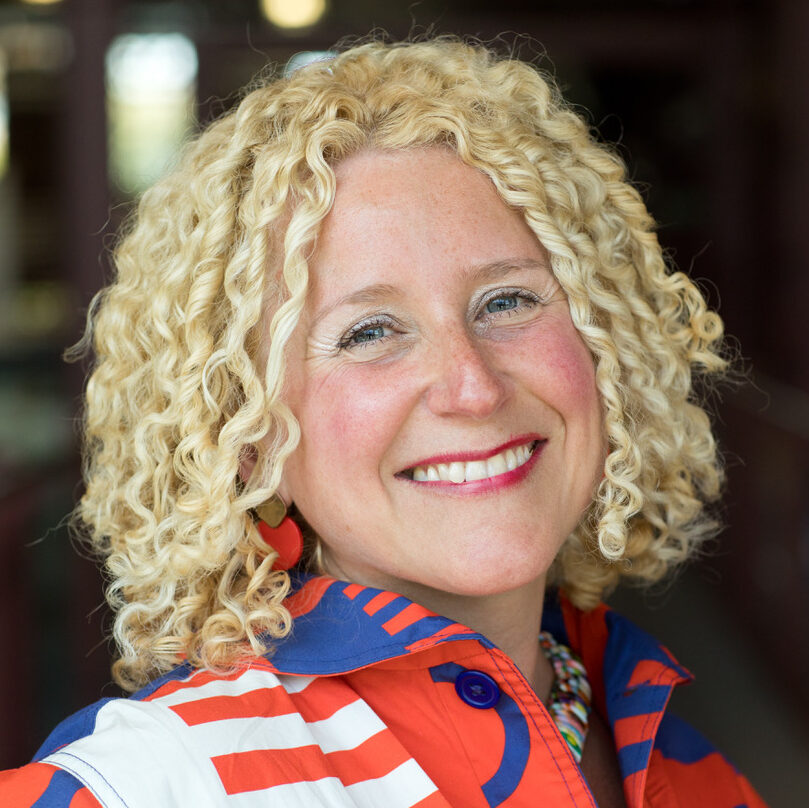
Meet Wilma Smith – Talent Executive
Wilma’s working background is in supporting and teaching through film which includes many years facilitating community arts projects for people of all ages, FE college and university lecturing and prior to joining the Short Circuit team, she was the Filmmakers Programme Manager at GMAC Film, developing new talent through commissioning scheme Little Pictures. She is the Co-vice President of Screen Talent Europe network which promotes international collaborations and filmmaker talent camps.
Wilma brings a wealth of experience and a keen eye for spotting emerging talent to Short Circuit. With a proven track-record in film production and a passion for discovering fresh voices, she is the perfect fit for nurturing the next generation of filmmakers. Wilma’s extensive industry connections and dedication to promoting inclusivity in film will undoubtedly bring new perspectives and creativity to our projects. Alongside our other Talent Executive, Miriam Newman, she will be the guiding force in identifying promising filmmakers and ensuring that their visions receive the support they deserve.
From Wilma:
“I’m delighted to join the team and to be working with new and existing talent across the Short Circuit and Screen Scotland slate. Bringing my own experiences and creative input as a writer/director and animator, I’m excited to fundamentally support and nurture emerging talent as they pursue their filmmaking journeys in the Scottish screen sector and further expand development opportunities internationally, through my connection with Screen Talent Europe.”
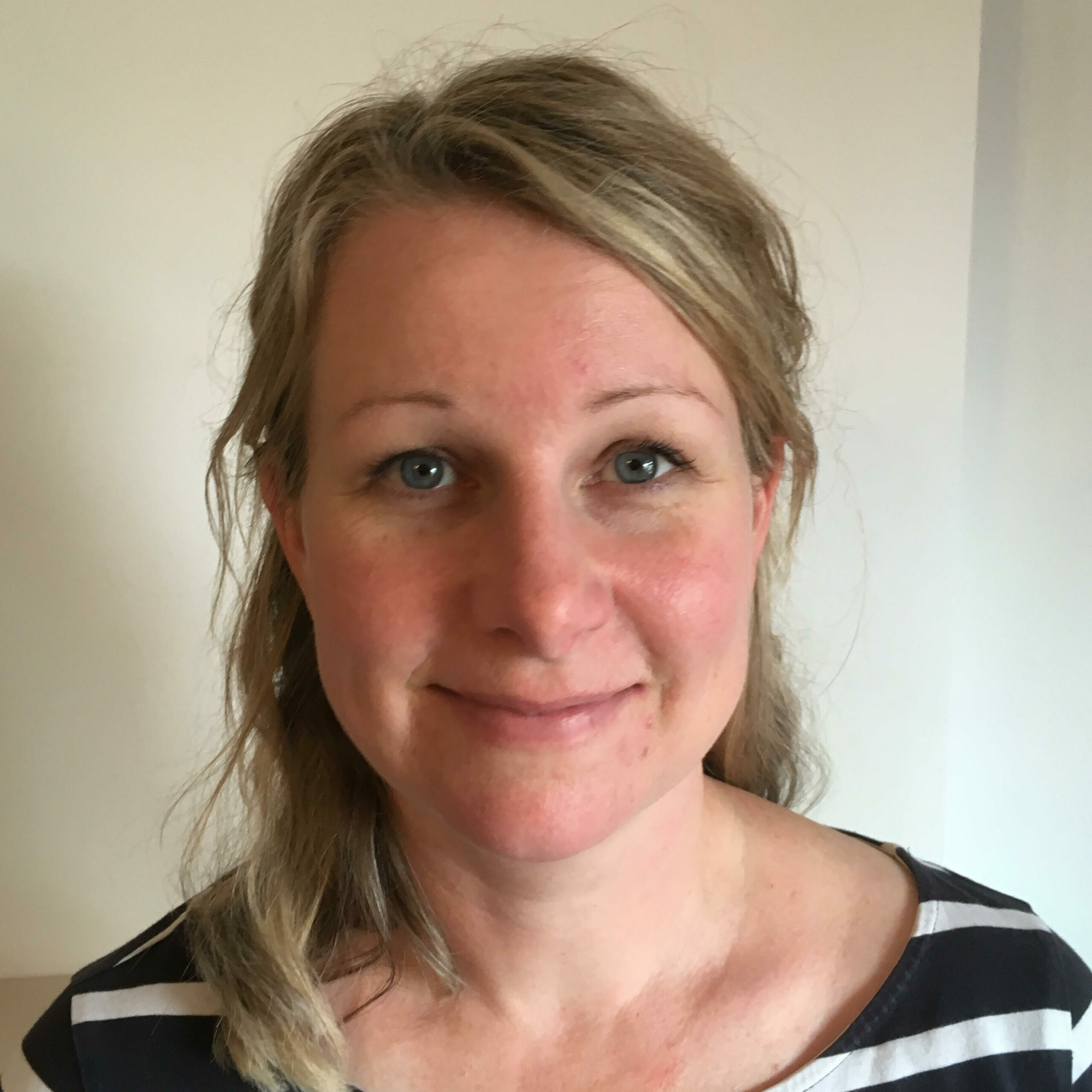
Meet Jennifer Hunter – Project Manager
Jen Hunter is an experienced Project Manager. Previous to joining Short Circuit Jen lead the Culture Counts project which was responsible for raising the profile and the understanding of the value of the wider culture sector across Government and Parliament. While at Culture Counts, Jen established the CPG Creative Economy and the CPG Culture and Communities networks at the Scottish Parliament, because networks provide us with an opportunity to get together to create change. Previous to Culture Counts Jen worked across entertainment unions, including undertaking an organisational review for the Scottish Artists Union and working for over eight years as an organiser for the Musicians’ Union within Scotland and Ireland.
Jen is interested in film due to the power that stories have to change narratives, particularly as we now live within a world of damaging misinformation, film plays a vital role in building understanding and empathy, particularly within complex issues. Her impressive project management skills and passion for supporting creative endeavours make her an invaluable asset to Short Circuit. With her wealth of experience, Jen will play a crucial role in overseeing the successful execution of our training and funding initiatives. Her ability to juggle multiple tasks with precision and dedication will ensure that every project will receive the attention it deserves, from development to completion.
From Jen:
“I am looking forward to joining the Short Circuit team and contributing to the growth of Scotland’s film industry. I am eager to collaborate with talented filmmakers and deliver projects that make a positive impact on our communities and the wider film landscape.”
Please join us in giving a warm welcome to Wilma and Jen! With their valuable contributions, we are confident that Short Circuit will continue to be at the forefront of Scotland’s film community, championing filmmakers and fostering innovation.
Keep up to date with our upcoming opportunities and events on Twitter, Instagram and Facebook.
As staunch advocates for diverse Scottish voices and emerging talent, we couldn’t be prouder to see these remarkable films making their way to new audiences. Through our support and guidance, we strive to provide a platform for filmmakers from all backgrounds and perspectives, ensuring their stories are heard and celebrated. The selection of these five films at EIFF 2023 reaffirms our commitment to championing diversity within the Scottish film industry.
The following films will be taking part in the Scottish Short Films programme on Sunday 20th August:
A.V. Van Morayo Akandé / Scotland / 2023 / 12 min
Two film-fanatic sisters try to reconnect with their estranged deceased father by selling his vintage porn collection.
BLACKWOOL Eubha Akilade / Scotland / 2023 / 15 min
On her first day at a high school in rural Scotland, a London teenager is targeted for her afro hair by a cocksure class bully and must harness her inner power.
The Möbius Trip Simone Smith / Scotland / 2023 / 17 min
A road trip pushes a dysfunctional family to the brink after their journey descends into a claustrophobic hallucinatory nightmare.
The Singer Cora Bissett / Scotland / 2023 / 20 min / British Sign Language, English with English subtitles
In the loud streets of Glasgow, deaf song-writer Joe meets busker Andy. The two learn to communicate over their love of music and realise together they can create something unique.
The following film will screen as part of the Animation Short Films programme on Wednesday 23rd August:
Living With It Holly Summerson / United Kingdom / 2023 / 7 min
Perfectionist Lee must adapt to the imperfect reality of living with an illness – brought to life as a chaotic supernatural flatmate: Bug. A dark comedy animated short about accepting the long-term effects of illness.
The Edinburgh International Film Festival is renowned for showcasing exceptional cinema and bringing together industry professionals, film enthusiasts, and curious audiences from around the world. The inclusion of these supported films in the festival’s programme is an outstanding achievement, signifying the talent and potential of Scottish filmmakers.
From Holly Daniel, Scottish Short Films Programmer:
From the absurd to the poignant, this programme showcases the challenges impacting all generations whether that be in relation to geography, circumstance, grief or good old family dynamics. Across writers, directors, producers, on-screen talent and crews, this exciting mix of films represents the amazing variety of filmmaking talent coming out of Scotland today.
We extend our warmest congratulations to the filmmakers whose works have been selected for EIFF 2023. This milestone is a testament to their hard work, talent, and unwavering passion. We eagerly anticipate the screenings and the opportunity for audiences to experience these compelling stories firsthand.
If you’re attending any of these screenings, let us know on Instagram, Facebook or Twitter.
When did your interest in filmmaking start and what were you doing before you became a filmmaker?
As an actor I have always been interested in what happened after you finishing shooting. When I was at drama school I set up a short film company with a few of my pals in order to try different roles in the industry. We would work on a script and film it over a weekend. The films were terrible as none of us had a clue how to step into roles on the other side of the camera but the experience was life changing and made me want to create more of my own work. The cross over of skill sets can only be a good thing as all experiences influence each other and therefor helps develop your craft from all sides.
What made you want to apply for Sharp Shorts?
I am super passionate about writing for screen and performing in my own work. However I had only written for theatre and really needed the guidance and lessons in order for me to develop skills for screenwriting. Short sharps offers that support in bucket loads. The amount I have learned from the team and workshops they provide though the program have been crucial in my development as an artist.
Tell us a bit about your Sharp Shorts-supported film.
Soul is a coming of age story rooted in the electric sub culture of Northern Soul. We had the most amazing time shooting the film. Community and opportunity was the beating heart of the story but also the way we wanted to shoot therefor we had members of our crew step into their first ever roles on set. I know how important it is to give people their first experience working on a job and wanted to create a supportive environment for others to learn and flourish. We shot in the town I grew up in which created an amazing buzz for the local community and had Northern Soul dancers from all around the country join us. Between takes we were spinning records and dancing. One of the dancers expressed, “this has been the best day of my life” which was so moving for me to hear. It was important to involve the community and people who gave me my identity through the soul scene and let them be apart of the film. I am so excited to share it with them.
What did you learn through taking part in Sharp Shorts? How was your experience working with the Short Circuit team?
The team are truly incredible. They made me feel so supported at every step of the development journey. The workshops have really been incredible and I have learnt a lot not only about being a filmmaker but also it has influenced the way I work as an actor.
What was your creative process? How did you get ready to make your film?
I had 3 different creative processes for Soul as I had 3 different roles on the film. Writing, acting and then directing. It was a huge amount of responsibility but I was ready for it due to the preparation and hard work I had dedicated to making sure the shoot would run smooth. Flipping between being in a scene on camera and then jumping off camera to re direct it was an amazing experience but it would not have been successful without a patient and supportive cast and crew. Picking the right team is essential to the shoot being a success, especially if you are juggling multiple roles.
Why do you feel stories like this are important?
Community, identity, sub culture and representing working class stories are all things I feel hugely passionate about putting on screen. The experience I had with my debut play Moorcroft was a majority working class audience who had never been to the theatre before, seeing themselves represented onstage and therefore feeling a sense of pride and importance. Everyone should be able to see their stories in the spotlight or on the big screen and feel that same sense of importance. Where I grew up feels like it is far from a film set but I wanted to turn it into one. The character and stories these places hold are unmatched. As I grow and work through my career, I really plan on continuing to champion the stories, people and places I grew up and make them feel they are worth being the main part. Northern soul has been there for me my whole life. Through the highs and lows. That dance floor has seen tears of happiness, sadness, grief, heartbreak, falling in love. You name it, those floorboards have felt it. The community in the soul scene is just incredible. People from all different life experiences coming together and letting loose on the floor. The fashion, music, scooters, tattoos and more are a total way of life for so many people. I have met some of the most interesting, kind, funny people at soul dances. Capturing the feeling this community creates and showcasing that on screen has been a dream come true. This is my love letter to the people and scene that has given me so much.
What are you hoping for audiences to get out of your film?
To want to get up and dance. To hug your family and friends that wee bit tighter and to remember how important your sense of self is. No matter what life throws at you or where you go in this world, you never forget where you come from and the people who helped you along the way.
What was the greatest hurdle you encountered whilst shooting, can you tell us how you overcame that?
Music! We have been on a wild journey to find the final dance track for our film. Northern Soul records are rare and in order to use them in a film we were looking at a huge amount of money which on a small budget was totally unachievable. We found really creative ways around this by looking at up and coming artists and bands within the scene and through this created amazing relationships with musicians who were excited about the idea of having their track feature in the film.
What piece of advice would you give to someone looking to apply for Sharp Shorts?
Give your heart and soul to your application. Your passion for the story you want to tell is essential in making your application stand out. The first draft of my script was miles and miles of a shooting draft but the whole point of the program is to learn and develop so don’t think you have to have everything totally worked out and perfect. Your ideas will change and grow as you learn and that is a magical thing. Embrace others ideas and also hold your vision as an artists. Those tow things work hand in hand. Good luck and as we say in the soul scene, keep the faith. Now go make some cool art!
Photo credit: Conor De Ath